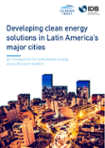Developing Clean Energy Solutions in Latin America’s Major Cities: An Introduction for Subnational Energy Policy Decision-Makers
Date
Dec 2017
This publication is intended to help sub-national energy policy decision-makers of major Latin American cities as they look to develop and implement clean energy solutions. Our aim is to help local actors to understand,
plan and execute initiatives successfully which, over time, will: save money, while increasing energy security, increase standards of living and the supply of more efficient and sustainable energy solutions, and reduce the overall use of energy and greenhouse gas emissions. While each city has its own individual circumstances, many common challenges are faced by major cities which can prevent the uptake of opportunities for improved energy management, energy efficiency and innovation in their energy systems. Due to the sheer size and complexity of large and megacities such challenges are
typically exacerbated; yet the scale of the opportunities and related potential benefits are also much more significant. Clean energy solutions have delivered substantial benefits to millions of citizens and thousands of businesses and civic institutions, providing material positive social, economic and environmental impacts. Latin America is one of the world’s most urbanised regions, with over 80 percent of its population living in cities. The region is currently home to five megacities (Buenos Aires, Lima, Mexico City, Rio de Janeiro and São Paolo). It is anticipated that by 2050 over 86 percent of Latin America’s population will live in urban areas.
plan and execute initiatives successfully which, over time, will: save money, while increasing energy security, increase standards of living and the supply of more efficient and sustainable energy solutions, and reduce the overall use of energy and greenhouse gas emissions. While each city has its own individual circumstances, many common challenges are faced by major cities which can prevent the uptake of opportunities for improved energy management, energy efficiency and innovation in their energy systems. Due to the sheer size and complexity of large and megacities such challenges are
typically exacerbated; yet the scale of the opportunities and related potential benefits are also much more significant. Clean energy solutions have delivered substantial benefits to millions of citizens and thousands of businesses and civic institutions, providing material positive social, economic and environmental impacts. Latin America is one of the world’s most urbanised regions, with over 80 percent of its population living in cities. The region is currently home to five megacities (Buenos Aires, Lima, Mexico City, Rio de Janeiro and São Paolo). It is anticipated that by 2050 over 86 percent of Latin America’s population will live in urban areas.




